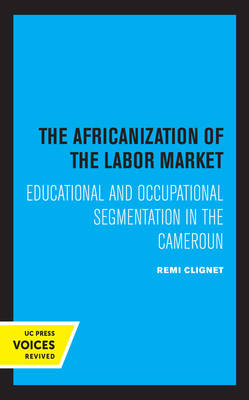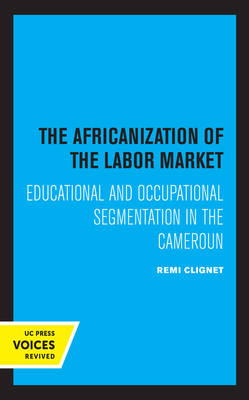
- Retrait gratuit dans votre magasin Club
- 7.000.000 titres dans notre catalogue
- Payer en toute sécurité
- Toujours un magasin près de chez vous
- Retrait gratuit dans votre magasin Club
- 7.000.0000 titres dans notre catalogue
- Payer en toute sécurité
- Toujours un magasin près de chez vous
The Africanization of the Labor Market
Educational and Occupational Segmentations in the Cameroun
Remi Clignet
Livre relié | Anglais
161,45 €
+ 322 points
Format
Description
This book offers a detailed analysis of the labor market segmentation in Cameroon, examining the social, educational, and occupational divides that influence labor market access and mobility. The author's primary focus is on how these divisions, rooted in colonial history and ethnic fragmentation, shape the participation of different groups within the modern industrial workforce. Cameroon's rapid urbanization, high population growth, and limited agricultural productivity have driven a migration of workers into urban centers, thereby expanding both industrial and service sectors. The study highlights the "late development" phenomenon in Cameroon, where educational advancement preceded the rise of large-scale industry, creating a labor force often more educated than the jobs available, and sparking shifts in hiring and promotion policies. The research addresses the differential treatment of manual and non-manual workers, arguing that the former face more barriers tied to ethnic and residential backgrounds, while the latter benefit from educational achievements that help transcend these limitations. This educational advantage allows non-manual workers, particularly those in white-collar roles, greater mobility and access to higher-paying positions. Chapter by chapter, the author explores how firm-specific factors such as size, age, and legal status affect employment practices and, ultimately, wage disparities. The study identifies employer strategies that segment the labor market, noting that while some firms adopt more universalistic policies, others continue discriminatory practices based on social or regional biases. In conclusion, the book situates Cameroon's experience within broader theories of industrialization and development, weighing gradualist strategies, which emphasize incremental change and agricultural support, against transformative strategies focused on rapid industrial growth. The study underscores the challenges of Africanization policies and the pressures on Cameroonian employers and policymakers to balance educational expansion with meaningful industrial and occupational opportunities. This work provides insight into the broader implications of late development for African labor markets and the struggle to create equitable, achievement-based occupational hierarchies in post-colonial settings. This title is part of UC Press's Voices Revived program, which commemorates University of California Press's mission to seek out and cultivate the brightest minds and give them voice, reach, and impact. Drawing on a backlist dating to 1893, Voices Revived makes high-quality, peer-reviewed scholarship accessible once again using print-on-demand technology. This title was originally published in 1976.
Spécifications
Parties prenantes
- Auteur(s) :
- Editeur:
Contenu
- Nombre de pages :
- 247
- Langue:
- Anglais
Caractéristiques
- EAN:
- 9780520370685
- Date de parution :
- 30-07-21
- Format:
- Livre relié
- Format numérique:
- Genaaid
- Dimensions :
- 152 mm x 229 mm
- Poids :
- 503 g

Les avis
Nous publions uniquement les avis qui respectent les conditions requises. Consultez nos conditions pour les avis.






